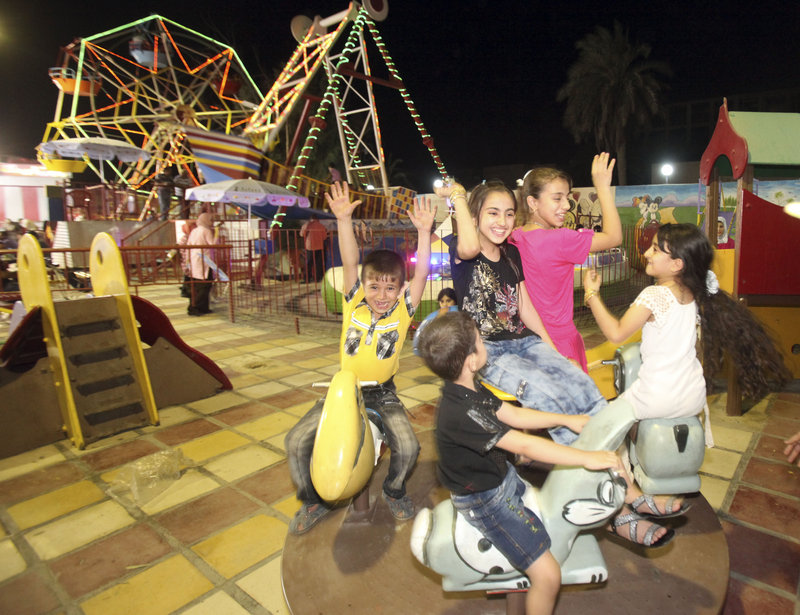– The Washington Post
BAGHDAD – On the last day of the official U.S. combat mission in Iraq, there was no dancing in the streets, no celebratory gunfire and no sense that a milestone had been reached.
U.S. troop levels have dropped to just below 50,000, fulfilling an Obama administration pledge to move from combat to stability operations. But as the United States prepares to declare the end of its seven-year-long war, Iraqis are bracing for uncertainty.
On Tuesday, Interior Minister Jawad Bolani said that the country is on high alert and that Prime Minister Nouri al-Maliki has created two security crisis cells – one for Baghdad and one for the rest of Iraq. The cells would respond in case violence escalates in coming days.
Bloodshed has already increased as Iraq nears the end of its sixth month without a government since national parliamentary elections.
Many Iraqis also say they worry that another country could fill the vacuum left behind by the United States and that the security gains of the past two years could erode.
“Right now we are in a state of emergency. Our brothers in the Ministry of Defense are sleeping in the ministry until this stage is finished,” Bolani told reporters Tuesday.
Maliki met Tuesday morning with Vice President Joe Biden, who is making his sixth visit to Baghdad on behalf of the Obama administration. At the start of the meeting, Biden questioned media reports of an increase in violence.
“It’s much safer,” Biden said. Reporters following the vice president Monday were asked to wear body armor and helmets, and Biden was heavily guarded throughout his trip.
Outside the heavily fortified Green Zone, where many of Biden’s meetings took place, Iraqis expressed fear and frustration.
“We wanted change, and nothing’s changed,” Mohammed Imad, 21, said, leaning against a wall covered in old election posters.
Despite the fears voiced in the streets, Maliki declared Tuesday a day of “celebration.”
“This is a day that will remain in the memory of all Iraqis. Today, Iraq has become a sovereign and independent country,” the prime minister said on state television. “Unfortunately, we are facing a campaign of doubt.”
“Whose celebration is this?” asked Ibrahim Abdul Wahab, 57, a resident of Haifa Street in downtown Baghdad, where Sunni insurgents were in control more than two years ago. “It’s his, not Iraq’s. Where are the promises of the planned democracy?”
Last week, when coordinated blasts rocked the country, killing more than 60 people, fliers and CDs were distributed in the street here. The flier declared that al-Qaida in Iraq was back and listed its operations, residents said.
“I see it in front of my eyes,” Wahab said, referring to the renewed bloodshed. “I see the roadside bombs, the attacks on the checkpoints. Al-Qaida reached to this street again.”
U.S. troops left Iraq’s streets more than a year ago, and Iraqis celebrated what they saw as their independence. But now those hopes appear muted.
“How many martyrs have there been since?” said Hadi Naji, 54. “How many widows, how many orphans, how many refugees?”
Since the 2003 U.S.-led invasion, Iraq has changed dramatically. Towering concrete blast walls encircle some Baghdad neighborhoods, and security checkpoints clutter the streets.
People have lived through an insurgency, U.S. offensives and a three-year civil war that killed tens of thousands of Iraqis and thousands of U.S. troops.
Attacks have dropped significantly since their peak, but major disputes in the country remain unsettled.
A U.S. intelligence official speaking on the condition of anonymity said that al-Qaida in Iraq is a shell of its former self and could not “credibly threaten the stability of Iraq’s government.”
As troop levels dwindle, the official said, the biggest worry is the internal political conflict.
“The greater concern is political reconciliation,” the official said. Iraq still has no government and Kurdish, Shiite, Sunni and secular parties are negotiating at a sluggish pace.
True reconciliation between Iraq’s mosaic of ethnicities, sects and religions has never taken place, and if the government is not inclusive, it could instigate further violence.
Even some senior U.S. military officials in Iraq expressed doubt that now is the time to make such a significant change. If things start to unravel, they said, they will lack the resources to act.
As U.S. combat operations officially ended Tuesday, a bombing killed two children – brothers – who were playing in the town of Haweja, west of Kirkuk.
Copy the Story Link
Send questions/comments to the editors.



Success. Please wait for the page to reload. If the page does not reload within 5 seconds, please refresh the page.
Enter your email and password to access comments.
Hi, to comment on stories you must . This profile is in addition to your subscription and website login.
Already have a commenting profile? .
Invalid username/password.
Please check your email to confirm and complete your registration.
Only subscribers are eligible to post comments. Please subscribe or login first for digital access. Here’s why.
Use the form below to reset your password. When you've submitted your account email, we will send an email with a reset code.